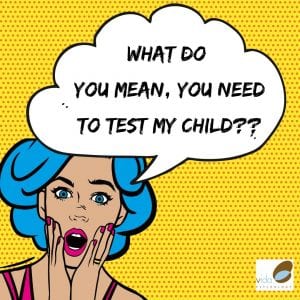By Melissa Bourchier
IQ Tests, Intelligence Testing, Cognitive Assessments, Educational Assessment, Achievement Tests… These terms are very confusing! Let’s look at two groups of testing here:
- IQ (Intelligence Quotient) testing, intelligence testing, and cognitive assessments are one group. I will refer to this as a cognitive assessment.
- Educational assessment, achievement tests, dyslexia testing, and reading assessment are another group.
Intelligence means awareness, knowledge, skills, and application. In the broader sense, it can involve creativity, thinking and learning. When psychologists conduct cognitive assessments we use standardised tools (meaning that a specific set of instructions is followed exactly the same way each time) to compare certain types of intelligence or thinking skills. At Vida Psychology, we most typically use the Wechsler tests, which look at how we think with words (verbal), make connections between concepts (fluid reasoning), think visually (nonverbal, visual-spatial), think quickly (processing speed) and remember small pieces of information (working memory). We are able to assign scores based on how well a child performs in each of these areas. We can then look at a pattern of strengths or weaknesses to determine diagnosis (e.g., Intellectual Disability, Giftedness ) or to better understand their learning capacity and design intervention strategies.
An achievement (academic) assessment combines various tools and activities to better understand a child’s learning profile. These activities will include writing, listening, talking, and other visual and hands-on puzzles. Tests are tailored depending on a child’s academic needs or depending on the referral question. Some of the learning difficulties we assess include:
- Reading (fluency, accuracy, decoding/phonics, comprehension)
- Written expression (spelling, fluency of writing, grammar and structure)
When conducting Educational Assessments, we use cognitive assessment and achievement assessment, along with parent information, to help us understand a child’s learning profile. We draw on multiple sources of information so that we can understand not only how a child is achieving at school but also the thinking processes that underlie their learning.
The most common reason to conduct a cognitive or achievement assessment is to understand how a child processes information and learns so that therapists and teachers can find the best way to help. For example, a child who struggles with reading but has strengths in how quickly they process information might be taught how to chunk parts of words (syllables, or onset-rime strategies) to use their speed strength; or taught how to slow down when breaking words into sounds (parsing) but praised for how quickly they can put them back together again (blending). They might benefit from flashcard drills for learning letters, with a focus on accuracy rather than speed depending on other parts of their profile. If your child is ‘sent for testing’ be sure to ask the purpose of the assessment (what is the referral question) so that the best types of assessments can be drawn upon to help your child.

